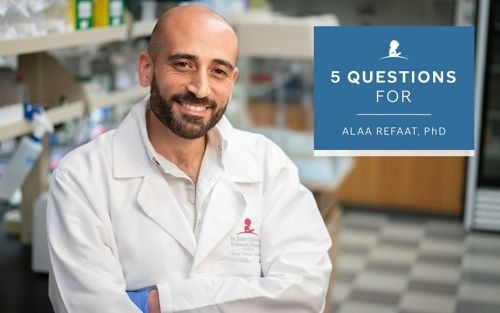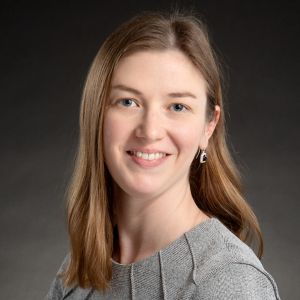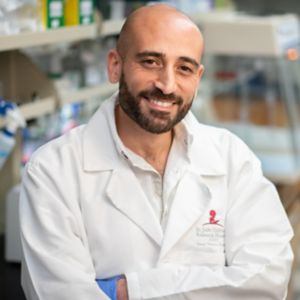St. Jude Family of Websites
Explore our cutting edge research, world-class patient care, career opportunities and more.
St. Jude Children's Research Hospital Home

- Fundraising
St. Jude Family of Websites
Explore our cutting edge research, world-class patient care, career opportunities and more.
St. Jude Children's Research Hospital Home

- Fundraising
5 Questions for Alaa Refaat

Alaa Refaat, PhD, St. Jude Department of Chemical Biology & Therapeutics is studying novel treatment approaches for childhood brain tumors.
This question-and-answer series explores the motivations, inspirations and accomplishments of investigators at St. Jude. Alaa Refaat, PhD, is a senior scientist in the laboratory of Anang Shelat, PhD, in the St. Jude Department of Chemical Biology & Therapeutics. His research focuses on novel treatment opportunities for childhood brain tumors.
1. Why did you decide to become a scientist?
Science is an extraordinary realm characterized by the daily unveiling of new discoveries. The path of a scientist perfectly aligns with my profound passion for exploration, problem-solving and analytical thinking. What makes science truly exceptional is that the rewards extend beyond financial compensation; they include disseminating knowledge through publishing one’s work and pursuing coveted placements in top-tier scientific journals. This accomplishment brings a profound sense of contribution to humanity. The impact of scientific research is not always immediate; often, it reverberates through the annals of time, benefiting generations to come. People will build upon your research, and our collective understanding of diseases will advance. I firmly believe that every ailment in human history possesses a treatment waiting to be unearthed by the dedicated efforts of scientists. To be part of this journey — to contribute to the collective pursuit of solutions — is truly gratifying and humbling.
2. What questions are you trying to answer through your research?
St. Jude Children’s Research Hospital has a powerful slogan, “Finding cures. Saving children,” which resonates deeply within our department. Our department chair, Aseem Ansari, frequently invokes this guiding principle. Our mission in the Department of Chemical Biology & Therapeutics is clear: we are committed to “Finding cures.” Within our research group, we concentrate our efforts on addressing pediatric brain tumors, a tragic leading cause of cancer-related fatalities among children. Our primary focus revolves around identifying or repurposing drugs to treat these tumors while gaining insights into potential resistance mechanisms. We’re currently engaged in captivating research endeavors, some of which have progressed to the stage of proposing clinical trials at St. Jude. Our ultimate aspiration is to revolutionize the treatment landscape for aggressive forms of pediatric brain tumors.
3. Why did you decide to join a laboratory at St. Jude?
St. Jude offers a distinctive environment designed to cater to those with a strong inclination towards research, as opposed to the traditional tenure-track route. St. Jude nurtures a stable, well-supported atmosphere replete with abundant resources and invaluable infrastructure. Here, scientists can wholeheartedly devote themselves to research, free from the logistical hurdles often encountered in other academic institutions.
In the lab, we find an exceptional platform for making a tangible impact on the health of our patients. But what truly sets us apart is the extensive collaborative network that extends within and beyond our institution. This rich tapestry of partnerships offers a wealth of opportunities for shared discoveries and innovation. Moreover, our core facilities and specialized centers house an impressive array of state-of-the-art technical capabilities, which, in turn, supercharge our research endeavors, making them exceedingly productive.
In the Department of Chemical Biology & Therapeutics, I see an environment that bridges the gap between academia and industry, where we possess the unique capacity to efficiently identify chemical tools for combating diseases. Here, we not only discover these compounds but also synthesize them, rigorously test them in both cell and animal models, and, ultimately, translate our findings into clinical trials. Our toolbox includes a combination of repurposed drugs and novel molecules, each holding the potential to make a profound therapeutic impact. This distinctive environment at St. Jude offers a set of features that is truly unparalleled, making it a hub of scientific discovery and translational success.
4. Tell me about a teacher, mentor or colleague who has helped you in your career — how important was their influence on your career path?
When reflecting on my career journey, it’s difficult to pinpoint a single mentor who has shaped my path. Rather, every supervisor I’ve had the privilege to work with has left an indelible mark on me. It’s in the early stages of one’s career where the guidance and support of mentors are absolutely critical. Without their advice and encouragement, progress can be a daunting challenge. I vividly recall one particular mentor who offered invaluable wisdom just before I embarked on my PhD journey in Japan. Their counsel was simple yet profound: “Look for new research areas rather than staying in your comfort zone.” In the dynamic realm of research, this advice resonates with me deeply because it’s a field where discoveries and technologies emerge daily. I’ve always had a penchant for exploring the uncharted, whether it be a new technology or a fresh area of study. While this approach presents numerous challenges, it’s equally brimming with excitement.
A great mentor is one who gently introduces you to novel concepts and exhibits patience in the process. I firmly believe that with the right mentor, one can achieve remarkable feats. I consider myself fortunate to have crossed paths with exceptional mentors throughout my journey. They’ve bestowed upon me the confidence that is quintessential for success. My list of mentors extends from my early undergraduate days through my formative career in Egypt, encompassing my enriching experience in Japan over several years, continuing through my research endeavors in the UK and Ireland, and finally, within the remarkable research community here at St. Jude. I’m immensely grateful for the trust that each of my mentors and supervisors has placed in me, as it serves as a powerful source of motivation to always strive for my best.
5. Where do you draw inspiration as an investigator when you encounter obstacles or frustrations in the lab?
The path of research is an enduring journey marked by numerous challenges. It’s a realm where positive outcomes from experiments aren’t a daily occurrence but where each setback offers a chance for learning and growth. In every negative result, we uncover a glimmer of hope, pointing us toward a new direction. At St. Jude, the inspiration to persevere is ever-present. As we walk through its halls and witness the children participating in clinical trials testing new medications, it becomes abundantly clear that we bear a profound responsibility. With the collective wealth of resources and knowledge harnessed by the dedicated teams at St. Jude, our mission extends beyond our institution’s walls. We aim to discover a ray of hope — the one that not only brightens the lives of children within St. Jude but radiates hope for children worldwide, regardless of where they may be.
Learn more:
- Visit the Shelat Lab
- Explore the Department of Chemical Biology & Therapeutics







